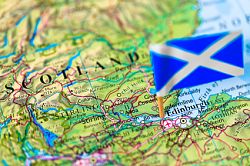

Health officials in Edinburgh have said it could take until the weekend before the extent of the deadly outbreak of Legionnaires' disease is known.
One man has died so far in the outbreak and 16 cooling towers in the city have been treated to kill the bacteria. However, because of its incubation period, more cases of Legionnaires' disease were expected. NHS Lothian have stated they are dealing with 17 confirmed cases and another 15 suspected cases of the disease.
Dr Duncan McCormick, chair of NHS Lothian's incident management team said, "The incubation period of Legionnaires' disease is between two and 14 days but the average is five or six days, so we're expecting to have more cases over the next few days. But if our evidence and reaction have been correct, we hope to have removed the source through our shock treatment of these cooling towers. We'd hope that by the weekend - five or six days after the treatment, we'll start to see a decline in cases."
The source of the infection is still being investigated with the potential area for infection estimated at about 44 square miles. Cooling towers in the south west of Edinburgh have been treated with a range of chemicals, including chlorine and bromine to kill the bacteria, and people living in the Gorgie, Dalry and Saughton areas are now considered to be at low risk. However, adult males who have an alcohol habit and an underlying illness such as diabetes, heart disease or lung disease are at greater risk and should contact their GP or NHS 24 if they start feeling symptoms of flu-like illness, together with diarrhoea, cough and confusion.
Dr McCormick has stressed that there is no threat to the city's public water supply. "The public water supply in Edinburgh is extremely closely monitored and in addition it's not possible to contract Legionnaires' disease through drinking water. It's contracted through the inhalation of water vapour in the form of an aerosol and that doesn't happen through drinking water supplies."
For more information, see the: